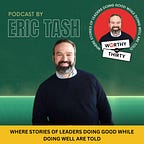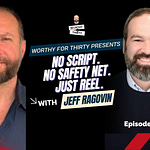For most of us, leaving a 20-year career as a senior leader in global banking with stops at renowned institutions like JP Morgan and HSBC sounds like an overwhelming, terrifying risk.
But for Cate Luzio, the founder and CEO of Luminary, it was simply the next logical step. Luminary is a gender-inclusive community and platform that has grown from a single 25,000 sq ft physical space in New York into a global network with members in over 30 countries.
In a frank interview on the Worthy for Thirty podcast, Cate shared the vital mindset shifts, non-negotiable business principles, and leadership strategies that allowed her to make the leap and build a thriving, impactful business.
If you’re standing on the precipice of leaving your stable job to pursue your big idea, or if you’re an entrepreneur looking to grow your impact, these takeaways from Cate are indispensable.
1. The Power of the Mentor’s Challenge: “Why Not Me?”
Cate’s pivot didn’t start with a burning entrepreneurial vision; it started with a powerful conversation. A mentor challenged her to define what she wanted to do next after nearly two decades in finance. This moment of reflection shattered the myth that an entrepreneur must always be born, not made.
The mentor’s advice served as a blueprint for minimizing risk and reframing the unknown:
“What’s the worst that can happen?” (You can always go back.)
“You always have your reputation, relationships, and resume to lean back on.” (Your past experience is your safety net.)
“You’re going to learn a hell of a lot in the process.” (The experience is the ultimate reward.)
Cate realized that if she could build or rebuild businesses inside massive corporations (which she did at JP Morgan and HSBC) aka being an ‘intraprenuer’, she could certainly build her own. Entrepreneurship, in this context, is simply taking an intrapreneurial spirit and applying it to your own company.
“I think I kind of approach so much of my life professionally, what’s the worst that can happen? I’m going to take the jump, and if it doesn’t work out, I’ve learned a lot in the process.” - Cate Luzio
2. Your Business Plan is Your North Star
Many founders get obsessed with a product idea but fail to do the foundational work. For Cate, a sound, strategic business plan is non-negotiable. She stresses that if you want to build a sustainable, scalable, and profitable business, you must lock down these fundamentals:
Salient & Actionable Takeaways for Aspiring Founders
Focus on the Market You’re Capturing, Not the Total Size: Don’t just brag about a “$10 billion market.” Detail the specific customer segment you are going after, the problem you are solving, and the revenue you can realistically attract.
Master Your Financials from Day One: Your financials are your key to success. You must have a fundamental understanding of when you will break even and become profitable. If you need to raise capital, know exactly how you will deploy those funds. Hint: watch ‘Shark Tank’ to know what I mean.
Conduct a SWOT Analysis (Strengths, Weaknesses, Opportunities, Threats): This one-page exercise is crucial. It forces you to look at the potential headwinds and tailwinds of your business, ensuring you have a realistic perspective before you launch.
Identify Your Competitors (They Exist): Do not assume you have no competitors. If you have the best product or service, you will quickly have copycats. Be aware of your landscape and plan for “co-opetition.”
3. The Path to Scale: Leadership by Delegation and Debate
You can’t scale an enterprise by being everywhere at once. Cate’s key to scaling herself from a single founder to a leader impacting thousands was a focused approach to team building and innovation.
Make Your A’s A+s, and Delegate the C’s: Cate’s “superpower” is her memory and sales ability. She focuses on her strengths (sales, people leadership, B2B enterprise) and strategically hires team members to handle areas where she not as great, such as digital marketing or operations.
Challenge Your Team to Challenge You: The founder should not be the sole source of ideas and innovation. Cate has created an environment where team members know they are encouraged to debate decisions and push back. Luminary Live, the company’s successful on-the-road experience, was an idea that came directly from her team.
Prioritize Impact as a Daily Win (The Small W’s): While financials matter, the headline success for Luminary is impact—the number of lives touched and businesses served. Success isn’t just a massive revenue swing; it’s the smaller, cumulative wins:
A great meeting leading to an enterprise client renewal.
Connecting one member to their future co-founder.
Providing community to someone navigating a major career change.
4. Building the Future: Luminary’s Roadmap
Cate’s mission is to keep creating space at the table for everyone. This includes a forward-looking roadmap that leverages strategic partnerships to amplify impact:
Fellowship Programs: The recent launch of a fellowship program with Marshalls, offering grants and full Luminary membership with no strings attached, shows a commitment to directly funding and supporting entrepreneurs.
New Areas of Impact: A partnership with Under Armour aims to prepare collegiate athletes for their professional lives, underscoring the value of athletic skills (teamwork, leadership, resilience) in the workforce.
5. Creating Space: The Golden Rule of Community Building
Luminary’s core mission goes beyond a physical office or digital content; it’s about solving a universal human discomfort: the feeling of not belonging. Cate shared a profound insight that many people, especially in new environments, worry there isn’t “room at the table” for them. Luminary’s success is built on intentionally eliminating that barrier through a culture of radical inclusion.
Eliminate Application Barriers for Self-Selection: Luminary is open to all genders and requires no application to join. This approach is based on the philosophy that true community should be self-selected and welcomes those who are actively seeking connection, reinforcing the “what’s the worst that can happen?” mindset. A community that aligns to Cate and her team’s vision and core, fundamental values.
Make Inclusion Your Core Tagline: The company’s original tagline, “Come sit at our table,” directly addressed the fear of exclusion. Your mission statement should clearly communicate that your business is a safe, welcoming place, setting the expectation for how members should treat each other (the Golden Rule).
Empower Your Employees as Community Equals: Treat your team members and your paying members as equals. When employees feel fulfilled, challenged, and supported, they naturally mirror that supportive culture back to the community, strengthening the foundation of the entire ecosystem.
Cate Luzio’s story is a reminder that entrepreneurship is an act of execution, not just ideation. It’s about tying and using your professional experiences to make your vision a reality, getting ruthlessly candid about your business plan, and assembling a team that pushes you to be better.










